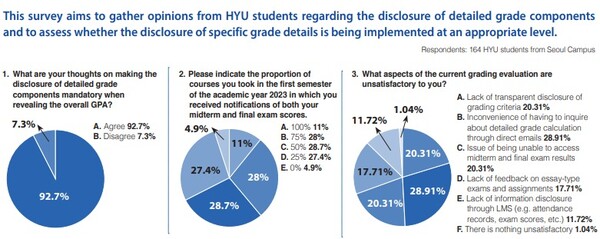Exams serve as crucial tools for universities to fulfill their educational purpose. However, doubts have been raised as to whether the current exams are evaluating all students in a fair and appropriate manner. As it stands, detailed grades are not disclosed and thus the criteria for the assessment of students’ performances are not revealed transparently from beginning to end. Without the disclosure of detailed grades, students cannot understand the reason and justification for their assigned grades. With such concerns being raised, the practice of questioning professors’ grading decisions to uncover the specifics of their grades persists.
Reasons Behind the Controversies
On Hanyang University (HYU)’s online community, “Everytime,” one post was uploaded demanding the mandatory disclosure of detailed grades based on the guarantee of students’ rights. The absence of regulations on mandatory grade disclosure in the university’s rulebook is the reason why most courses do not provide detailed grades when announcing final grades. But what does the term “detailed grades” actually mean? It generally includes midterm and final exam grades, as well as the overall course average. According to a survey conducted by Hanyang Journal, only 11 percent of students reported receiving notifications on all of their exam scores for the courses they took in the first semester of the academic year 2023. Under the current grade inquiry system, most courses only provide overall grades, and the decision to disclose grades and their scope is at the discretion of the professors.
Students’ Stance
HYU’s current grade disclosure system only specifies the final grade assigned. As a result, if students are dissatisfied with their grades or have questions regarding them, they must personally ask the professor in charge. If students are unable to effectively communicate with their professors during this process, or receive merely superficial responses, they may find it difficult to trust the accuracy of their grades. Kim Na-eun, a Sophomore majoring in the School of Business, said, “There are many professors who do not provide clear explanations for grades, and their evaluation criteria often differ from what is stated in the course syllabus on the ‘LMS.’ However, due to professors’ negative attitudes towards grade appeals, students are often unwilling to raise specific concerns and thus may hesitate or even give up on filing appeals and requesting detailed grade disclosures.” Furthermore, she also claimed that despite the grade disclosure period lasting for a week, some professors announce grades late, which leaves little time for students to file their appeals at all. She added, “Some professors do not input their grades until the last minute. This leaves students with little time to reflect on their performance over the semester and come to terms with their grades. They must make quick decisions on grade appeals the very next day and engage in rapid email exchanges with professors about their objections before the final deadline. This makes the process excessively rushed and demanding.”
Professors’ Stance
Grades are entirely at the discretion of the professors in charge. Because of this, if the responsible professor refuses to have a face-to-face meeting, there is little the student can do. This emphasizes the urgent need for institutional measures to safeguard students during the grade appeal process. Professor Min Chan-hong from the Department of Policy said, “Being told of their grades in a detailed manner is a student’s deserved right. They are entitled to be curious, and educators have an obligation to inform them about how the evaluation was conducted.” Moreover, according to the aforementioned survey, 52 percent of students responded that if the disclosure of detailed grades were to be implemented, it would be essential for professors to provide feedback on descriptive and essay assignments as well. Professor Min mentioned that this aspect should be carefully considered. “Rather than solely disclosing scores, providing descriptive feedback can highlight aspects beyond mere scores and offer a more comprehensive evaluation of students’ abilities and competencies. Students would greatly benefit by being able to identify specific areas where they have excelled or where they require improvement.” However, providing feedback for essay-type assignments and written tasks should not be limited to the end of the semester when all grades are finalized. Instead, Professor Min emphasized the importance of establishing a system where feedback can be provided on an ongoing basis.

School’s Stance
As proved by a previous survey, 93 percent of students on campus recognized the importance of disclosing detailed grades, and numerous efforts are being made on campus in this regard. The Student Council has formed a task force team called “Good Class TFT” and has requested that the HYU Academic Team introduce a detailed disclosure system. The progress of the implementation is being posted through a report on the outcomes of the “Central Operations Committee” meetings. In order to enable the disclosure of detailed grade information on the “HY-IN” portal in the future, it will be necessary to review the technical aspects of the system. Former Vice President of the 2023 HYU Student Council, Bang So-won said, “Due to the nature of the detailed grade disclosure system, it is difficult to enforce its implementation as the authority over grades lies with the professors. This is a complex issue involving various stakeholders, so the academic team and the student society should continue engaging in ongoing discussions to incorporate opinions effectively.” Additionally, she pointed out the flaws in the current grade disclosure system and emphasized the necessity of implementing a detailed grade disclosure policy. “Although there is an ‘appeal’ system, it becomes challenging to utilize the system when grades are posted late. Inquiries via personal email may also lead to delayed or no responses from professors, causing inconvenience for both students and professors due to the need to respond to emails and texts individually. The current method of inquiry creates procedural and other inconveniences for both parties.”

Conclusion
To fulfill the essential function of grading in universities, the entire process should be transparent and detailed enough for everyone to understand. Disclosing detailed grades is a necessary condition for fair evaluation. Given that many other universities also mandate grade-by-grade disclosure, HYU students should be able to access their right to know as soon as possible. The mandatory disclosure of detailed grades will be a positive means of facilitating effective teaching and learning.


